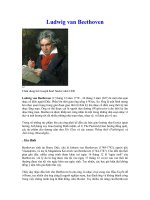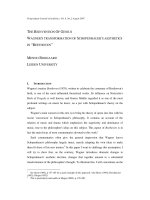beethoven
Bạn đang xem bản rút gọn của tài liệu. Xem và tải ngay bản đầy đủ của tài liệu tại đây (30.78 KB, 2 trang )
Beethoven BEETHOVEN, Ludwig van (1770-1827) The
composer of some of the most influential pieces of music everwritten,
Ludwig van Beethoven created a bridge between the
18th-centuryclassical period and the new beginnings of Romanticism. His
greatestbreakthroughs in composition came in his instrumental work,
includinghis symphonies. Unlike his predecessor Wolfgang Amadeus
Mozart, for whomwriting music seemed to come easily, Beethoven always
struggled toperfect his work. Ludwig van Beethoven was born in Bonn,
Germany, and was baptized onDec. 17, 1770. (There is no record of his
birth date.) His father andgrandfather worked as court musicians in Bonn.
Ludwig's father, asinger, gave him his early musical training. Although he
had only meageracademic schooling, he studied piano, violin, and French
horn, andbefore he was 12 years old he became a court organist.
Ludwig's firstimportant teacher of composition was Christian Gottlob
Neefe. In 1787 hestudied briefly with Mozart, and five years later he left
Bonnpermanently and went to Vienna to study with Joseph Haydn and
later withAntonio Salieri. Beethoven's first public appearance in Vienna
was on March 29, 1795,as a soloist in one of his piano concerti. Even
before he left Bonn, hehad developed a reputation for fine improvisatory
performances. InVienna young Beethoven soon had a long list of
aristocratic patrons wholoved music and were eager to help him. Onset of
Deafness In the late 1700s Beethoven began to suffer from early
symptoms ofdeafness. The cause of his disability is still uncertain. By
1802Beethoven was convinced that the condition not only was
permanent, butwas getting progressively worse. He spent that summer in
the country andwrote what has become known as the "Heiligenstadt
Testament." In thedocument, apparently intended for his two brothers,
Beethoven expressedhis humiliation and despair. For the rest of his life
he searched for acure, but by 1819 his deafness had become total.
Afterward, in order tohave conversations with his friends, Beethoven had
them write down theirquestions and replied orally. Beethoven never
married. Though he had many friends, he seemed to bea lonely man. He
continued to appear in public but spent more and moreof his time working
on his compositions. He lived in various villagesnear Vienna and took
long walks carrying sketchbooks in which he wouldwrite down his musical
ideas. Scholars who have studied thesesketchbooks have discovered the
agonizingly long process that thecomposer went through in order to
perfect his melodies, harmonies, andinstrumentations. Three Periods of
Work Most critics divide Beethoven's work into three general
periods,omitting the earliest years of his apprenticeship in Bonn. Although
somepieces do not fit exactly into the scheme, these divisions can be
usedto categorize the composer's work. The first period, from 1794 to
about 1800, consists of music whosemost salient features are typical of
the classical era. The influence ofsuch musicians as Mozart and Haydn is
evident in Beethoven's earlychamber music, as well as in his first two
piano concerti and his firstsymphony. Beethoven added his own
subtleties, including sudden changesof dynamics, but in general the
music was well constructed and not farfrom the sensibilities of the
classical period. The second period, from 1801 to 1814, includes much
of Beethoven'simprovisatory work. His Symphony No. 3, known as the
"Eroica," and the'Fourth Piano Concerto' are fine examples of this period.
The final period, from 1814 to the end of his life, is characterizedby even
wider ranges of harmony and counterpoint. The last stringquartets
contain some of the composer's most vivid new ideas. Beethovencreated
longer and more complicated forms of music. In his symphoniesand string
quartets, he often replaced the minuet movement with alivelier scherzo.
He also used improvisatory techniques, with surpriserhythmic accents
and other unexpected elements. Many critics and listeners regard
Beethoven as the finest composerwho ever lived. His music was unique
and emotional. Never before hadinstrumental music been brought to such
heights. He also made greatstrides with chamber music for piano, as well
as for string quartets,trios, and sonatas. His works include nine
symphonies, 32 piano sonatas,five piano concerti, 17 string quartets, ten
sonatas for violin andpiano, one opera ('Fidelio'), the 'Mass in C Major',
'Missa Solemnis',and other chamber music. Beethoven died in Vienna
on March 26, 1827. His funeral was attendedby hundreds of mourners.
The bicentennial of his birth and thesesquicentennial of his death were
celebrated with new performances andrecordings of all of the master's
works. Word Count: 769









